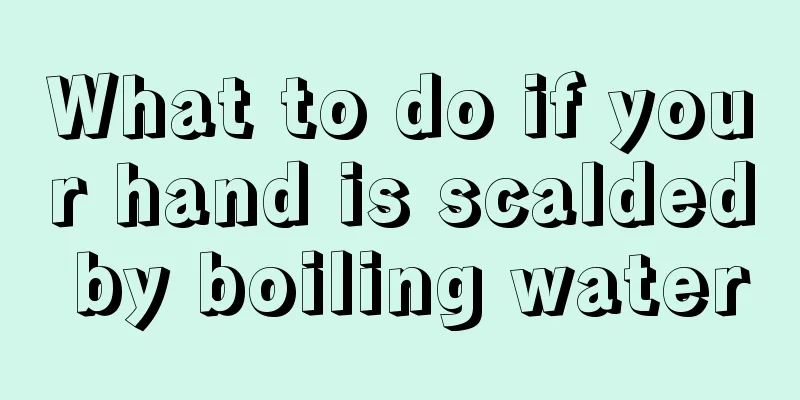What to do if your hand is scalded by boiling water

|
Scalding occurs frequently in our daily life, especially being scalded by boiling water, which is something that many people have encountered. The response measures for scalds caused by boiling water are different depending on the severity of the scald, but it is very important to respond in a timely manner when the scald just occurs. This is what we should pay attention to. So, what should you do if your hands are soaked in boiling water? Let’s take a look below. Burn classification First degree burn First-degree burns are the least damaging. Only the epidermis is injured, the injured skin becomes red and swollen, feels burning pain, is obviously tender, and has exudation or edema. The injured area turns white locally when light pressure is applied, but there are no blisters. Second degree burns Second-degree burns are deeper injuries. Blisters of varying sizes appear on the skin at the scald site. The bottom of the blisters are red or white and are filled with clear, sticky liquid. The injured skin blisters and becomes hot, and the pain is unbearable. Third degree burns Third-degree burns are the deepest. The surface of the burn may turn white, soft or black, the necrotic skin may stick to the base and cannot be torn off, the skin of the injured area may be burnt and the flesh may be rotten, the entire affected area may have no elasticity and be like leather, and in severe cases even the tendons and bones may be injured. For burns of severity above level 2, please go to the hospital for medical treatment in time, and follow the doctor's instructions for care precautions. This article mainly introduces the first aid care and recovery care for minor burns on the hands. Emergency Care Cold water rinse If your hands are scalded by hot soup, oil, water, etc., don't panic. Rinse them immediately with cold water until the skin surface no longer feels hot. Cold water flushing helps cool the skin surface, prevents the injury from expanding, relieves pain, reduces fluid exudation and swelling, and avoids or reduces blister formation. Pay attention to controlling the water pressure to prevent the skin on your hands from breaking and causing infection due to flushing. Control the water temperature below 20 degrees. To prevent frostbite on the skin, do not use ice water. Medicine After cooling with cold water, the wound should be wiped dry with clean gauze, and then a thin layer of medicine for treating burns, such as moist burn ointment, Jingwanhong, green ointment and other ointments, should be applied, and then appropriately bandaged for 1 to 2 days. Treating Blisters If blisters form, be careful to protect them and do not break them easily to prevent infection. If you must prick the blister, please use a sterilized needle to absorb the fluid and disinfect the wound about 3 days after the blister appears. If the blister is accidentally broken, you should wipe it dry with a sterilized cotton ball to keep the skin surface dry and avoid letting the blister fluid accumulate into lumps. Severe burns In case of severe burns on the hands, give the hands emergency cold treatment and immediately go to the hospital. Do not apply gentian violet or mercurochrome to avoid the color of the drugs affecting wound observation. Recovery Care No scratching After the wound scabs, you need to wait patiently for the wound to heal. Scratching or forcibly removing the scab can easily cause scarring and pigmentation of epidermal cells, and even take away newly grown epidermal cells, stimulating local inflammatory reactions. Scratching the skin can also stimulate local capillary dilation and granulation tissue proliferation, forming scars. Be mindful of your diet Pay more attention to supplementing foods rich in vitamins and protein, such as eggs and vegetables. Avoid irritating foods such as tobacco, alcohol, chili peppers, ginger, garlic, mustard, coffee, etc. Also, be careful not to eat foods containing lead, as lead will aggravate pigmentation. Sun protection Ultraviolet rays are strong in the summer, so wounds should be protected from the sun because the ultraviolet radiation in the sun can cause pigmentation in the tender new skin. Avoid using cosmetics and soap If your hands are burned and blistered, do not allow cosmetics or soap to come into contact with the wound. Because some cosmetics contain heavy metals such as lead, mercury, silver, and photosensitive substances, they will increase skin pigmentation. |
<<: How to protect the femoral head?
>>: What are the dangers of skipping lunch
Recommend
What can’t be eaten with eel
Speaking of eels, I believe everyone will think o...
What is beauty and what kind of beauty is suitable for you?
The word "beauty" is very popular nowad...
Will pregnancy with prostatitis cause deformity
Prostate disease is one of the serious diseases t...
The efficacy and function of patting the back of the hand
Traditional Chinese medicine emphasizes the smoot...
Which liver cancer patients are not suitable for interventional treatment? 7 types of people are not suitable for interventional treatment of liver cancer
Interventional treatment of liver cancer is to in...
Can I wash my feet after an abortion?
In fact, the physical recovery period after abort...
Minimally invasive surgery process for rhinitis
Most rhinitis drugs can only control the conditio...
Is it normal to have occasional insomnia?
Insomnia is becoming more and more common in our ...
How to treat gingival recession?
The gums are a layer of tissue located at the roo...
What can soften fish bones
Generally, fish bones can be softened by edible v...
What to eat when your teeth are bleeding?
Many friends will find that if they eat some irri...
Is hydrohepatic effusion contagious?
Generally, diseases related to the liver are cont...
How long can one live with bone metastasis of cervical cancer
At this time, if the patient receives active and ...
How to stimulate yourself to defecate
Constipation is also a very painful thing, so how...
Are there any early symptoms of breast cancer? Be more vigilant if you have these ten symptoms
China is a high-incidence area for breast cancer....









